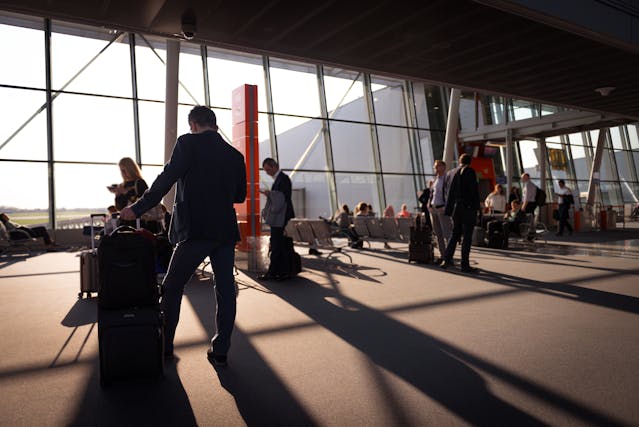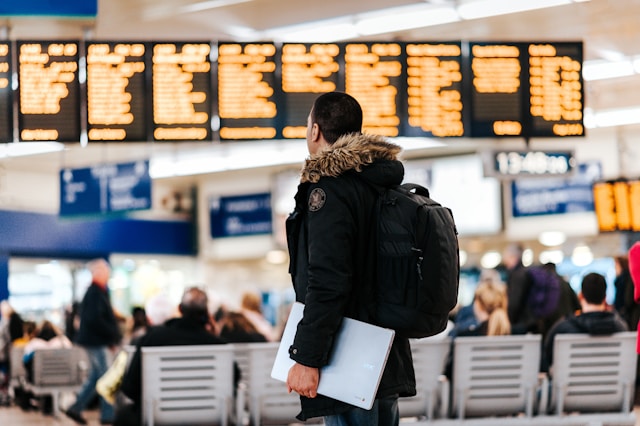Flight delays are never fun, but they happen. Whether it’s due to weather issues or other unforeseen circumstances, delays can throw a wrench into your travel plans.
The first thing you should do is stay calm and check your airline’s app or website for the latest updates. This way, you can stay informed about your new departure time and any available rebooking options.
While waiting at the airport, take advantage of the amenities available. You might find a comfortable lounge, a good restaurant, or an interesting bookshop to help pass the time.
Sometimes, a delay can become an opportunity to explore parts of the airport you never had time to visit before.
Don’t forget to reach out to the airline staff for assistance. They can provide you with information about alternative flights, meal vouchers, or even hotel accommodations if the delay is extensive.
Being polite and patient can often lead to quicker and more helpful responses from the staff.

Understanding Flight Delays
Flight delays can be frustrating, but they often stem from unavoidable factors. It’s important to know what causes these delays and what your rights are in these situations.
Common Causes of Delays
Several factors contribute to flight delays. Bad weather tops the list; thunderstorms, snow, and fog can disrupt schedules significantly.
Air traffic control also plays a crucial role. Air traffic controllers manage planes both in the sky and on the ground, balancing safety and efficiency.
Mechanical issues with the aircraft can be another reason for delays. Airlines must ensure that all planes meet strict safety standards before flying. Federal regulations enforce these standards, prioritizing passenger safety over punctuality.
Additionally, crew issues such as duty time limits and availability can impact flight schedules.
Your Rights and Airline Policies
When faced with a significant delay, knowing your rights is crucial. In the U.S., the Department of Transportation has regulations in place to protect passengers.
For domestic flights, if an airline causes a delay or cancellation, it may provide compensation for the flight canceled, such as meal vouchers or hotel accommodations.
However, bad weather-related delays often exempt airlines from offering compensation. It’s essential to check the airline’s specific policies, as these can vary – Airhelp can help with the compensation computation.
Many airlines outline their delay policies on their websites, providing details on how they handle disruptions.
Moreover, being aware of your rights helps you navigate the situation more effectively and ensures you receive any entitled assistance.

Immediate Steps to Take
When you learn about a flight delay, it’s important to act quickly to minimize inconvenience. Focus on contacting customer service, using technology for the latest updates, and exploring alternate travel options to stay ahead.
Contacting Customer Service
Immediately contact the airline’s customer service. You can reach them through the call center, social media, or directly at the airport.
Speaking with a gate agent is also a good move. They may provide updated information faster than other sources.
Additionally, many airlines have chat features on their websites or apps, which can be faster than waiting on hold during peak times.
Tip: Be polite and patient. Remaining calm and respectful will help customer service representatives better assist you.
Utilizing Technology for Updates
Use technology to stay informed about your flight status. The airline’s app often provides real-time updates.
Flight-tracking websites like FlightAware can also give comprehensive flight status information.
Enabling push notifications on your phone can alert you to changes as they happen.
Monitoring your airline’s social media accounts can give you quick updates and alternatives that might be suggested by others in similar situations.
Pro Tip: Sign up for text and email alerts when booking your flight to get automated updates.
Exploring Alternate Travel Options
Check if there are other flights going to your destination. Sometimes, flying into an alternate airport can save you time.
Look into connections with partner airlines that might have available seats.
Speak with the gate agent to discuss the possibility of re-routing your travel plans.
Often, airlines can book you on another flight or find an alternate route that gets you to your destination sooner.
If all else fails, consider other transportation methods like buses, trains, or rental cars, depending on the distance and urgency of your travel needs.
Advice: Act quickly, as alternate options may fill up fast during widespread delays.

Long-Term Travel Solutions
When facing flight delays, thinking long-term can save time and reduce stress. This includes investing in travel insurance and building flexibility into your travel itinerary.
Investing in Travel Insurance
Investing in travel insurance can provide valuable protection if your flight gets delayed. Coverage often includes reimbursement for accommodation, meals, and even alternative transportation.
Be sure to research policies to understand what’s covered and the eligibility requirements for claims.
Some insurance plans also offer trip delay benefits that compensate you for lost time.
Consult your travel advisor to find the best plan. Elite status with some airlines might offer additional perks, so it’s worth looking into.
Be persistent in understanding your policy details before purchasing.
Building Flexibility Into Your Travel Itinerary
Building flexibility into your travel itinerary allows you to adapt easily to unexpected delays.
Use miles to book flights with flexible change policies.
Consider scheduling critical events a day after your planned arrival, giving you a buffer for significant change.
Research alternate routes and transportation options before you travel.
Being adaptable can save you money and time.
It also reduces stress, knowing you have a plan B in place.
Use your travel advisor to help craft a flexible itinerary tailored to your needs.



